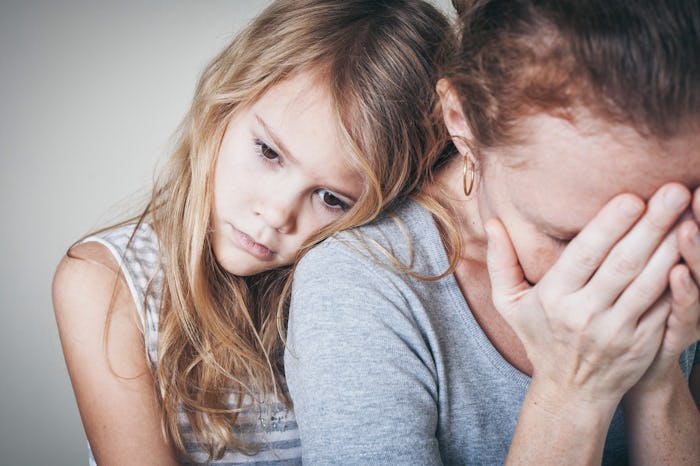Life

7 Effects Postpartum Depression Has On The Family
When a mother is dealing with postpartum depression (PPD), she's not the only one who is affected. The effects postpartum depression has on the family can be seen in children and spouses as well. Although the mother feels the biggest weight of the condition, her loved ones experience many emotions as well. Over the years, researchers have been working to connect the dots between postpartum depression and child development, as well as how the condition affects marriage. This effort is one that can bring to light positive outcomes for the many families living with a mother who has PPD.
According to the website for The Postpartum Stress Center, "postpartum depression affects 20 percent of all postpartum women," but thankfully is a condition that has successful treatment outcomes. Furthermore, the support a mother receives from her spouse and family can positively influence her recovery. Having a trustworthy person to help take care of the baby while she manages her self-care is a huge asset to a mother struggling with PPD, as the American Psychological Association pointed out. Working as a team to battle this condition can make the family unit stronger in the long run.
To understand the ways postpartum depression can effect the whole family, take these seven examples into consideration.
1There Is A Lack Of Bonding
No matter how much a mother desires to feel close with her baby, PPD can stand in the way of making connections. According to Parents magazine, mothers struggling with postpartum depression are less likely to engage in bonding behaviors, such as making eye contact, talking in an engaging voice, and playing with their baby. This can cause infants to have poor interactions with others and become withdrawn.
2There Is Misplaced Blame
Watching a partner suffer with postpartum depression is an emotional and difficult position to be in. A search for answers may lead some to blame themselves for the current state of their loved one. But as the website for The Postpartum Stress Center pointed out, PPD is no one's fault — not the mother's, not the partner's, and not the baby's.
3There Are Multiple Caregivers
Dealing with postpartum depression requires a lot of self-care and setting realistic expectations. This means the mother will need time to invest in her road to recovery, which may require helps from others. As the American Psychological Association recommended, being realistic about what your parenting limits are when treating PPD is important, so friends, family, or a nanny may have to step in and care for the baby at times. But having support is important in recovery and making time to treat the condition is a priority.
4There Is Trouble Adjusting
In an article written for the Encyclopedia of Early Childhood Development, psychologists E. Mark Cummings and Chrystyna D. Kouros explained that, "children of depressed mothers are at least two to three times more likely to develop adjustment problems, including mood disorders." Although this is not present in all children of mothers with PPD, it is a well-documented outcome.
5There Is A Less Stable Home Environment
Managing postpartum depression while keeping up with the demands of parenting can cause some things to slip through the cracks. Children experience less stable environments when the mother is depressed, according to the website for Scientific American. Due to PPD, mothers may not adequately childproof the home, be consistent in discipline, or have trouble keeping and making appointments important to the child's wellbeing.
6There Are Struggles In Your Marriage
Postpartum depression doesn't just affect the mother-child relationship, it can take a toll on romance as well. As Psychology Today pointed out, PPD can cause marital dissatisfaction and problems in a marriage. But the silver lining is that many couples can and do work through this condition as a team. In fact, staying the course together often results in partners feeling closer to each other after recovery is complete.
7There Is A Fear In Children
As the website for Psych Central reported, babies of mothers with PPD are less able to regulate fear and negative emotions. This finding comes from a study published in the Journal of the American Academy of ChildAdolescent Psychiatry, in which researchers compared the social-emotional growth outcomes of babies with mothers who suffered from postpartum depression to babies of mothers who did not.